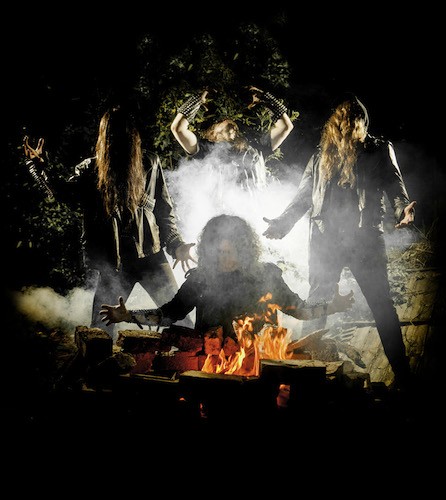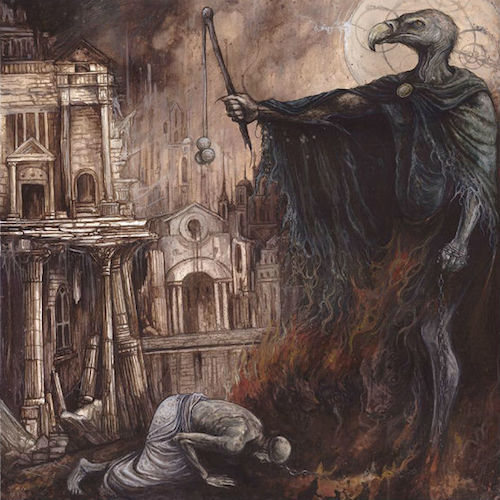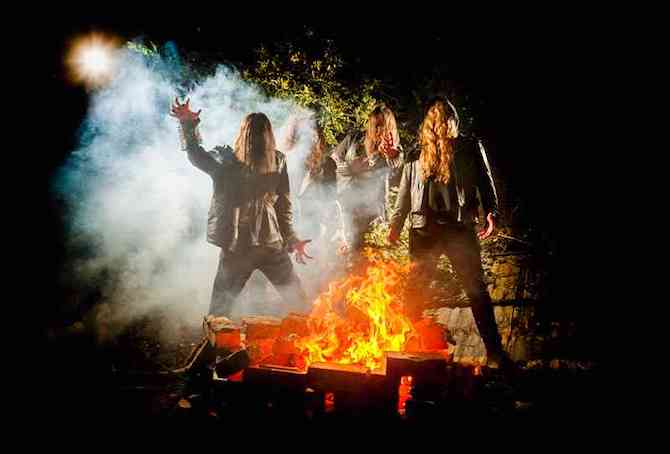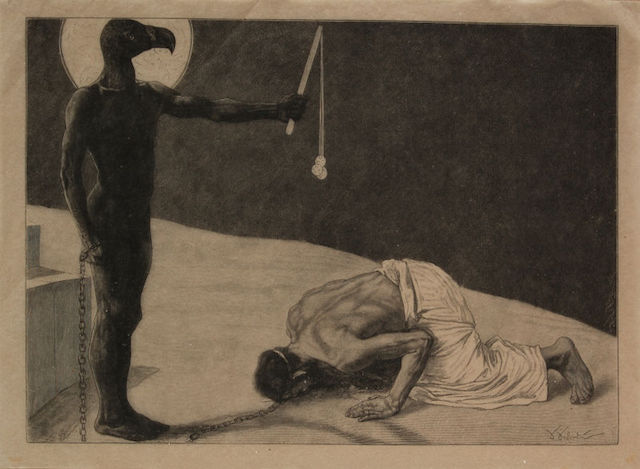(Argentinian writer Matías Gallardo presents this interview with S. Vrath, guitarist/vocalist of Craven Idol, whose savage new album The Shackles of Mammon was released in April by Dark Descent Records.)
Four years ago, Craven Idol’s debut Towards Eschaton put the London four-piece among the most insane and relentless heirs of old school extreme metal. This year the band takes its blackened metal one step forward with The Shackles of Mammon, an album where the influences of Poison (Ger), Bathory, Manilla Road, and Deströyer 666 resonate in an impressive landscape of filthy and addictive noise.
Guitarist/Vocalist S. Vrath spoke with NCS to share his thoughts about Craven Idol’s new masterpiece.
******
Compared with Towards Eschaton, it feels like The Shackles of Mammon is a much more organic, violent, and vicious album. Was this a conscious decision?
I’m glad you think so. I would agree! With a few exceptions, The Shackles of Mammon was written in about two years with a fast pace (at least for us). So there’s a sense of continuity to everything. With Towards Eschaton some of the material dated back to the demo days of the group (hence it was written over the long timespan of eight years ultimately) and was originally meant as an E.P. So in a way this is our first complete work of new material, with the exception of demo song “Dashed to Death and Black Flame Divination”, which I wrote back in 2005.
All in all, the writing process was very organic, as you put it, with yours truly creating structures and riffs and then bringing it to drummer Heretic Blades to take it to the next level. Then one-by-one, the rest of the group comes in. The “violent and vicious” nature of the record is very much a sign of the times… from the outset I wanted this to blow the debut out of the water and into the flames.
Founding member Scourger left the band in 2015 and wasn’t part of the creation of this new album. What happened?
Scourger and I started writing the album soon after we ceased gigging in support of Towards Eschaton, but it became clear very quickly that his focus was with his other bands Solstice, Leathean, and Deceptor. He’d also moved to Nottinghamshire, so we barely met up any more. I happened to be in one of my writing frenzies and so he encouraged me to take the band forward without him. I wasn’t sure whether that would even be possible at first, and I must thank the other members for making it a reality.
This is the first album you’ve done with Heretic Blades and Obscenitor in the band. They’ve been part of the band for three years now, so how did they end up joining Craven Idol?
Obscenitor originally joined as a session guitarist when Scourger moved back to drums after Volgard’s departure. Alas, Scourger didn’t much enjoy his role as a drummer, so we started looking for alternatives, especially with Obscenitor fitting into the Craven image perfectly.
I’d known Heretic Blades from the concert promoter circles for some years (he runs the mighty Isengard Promotions) and knew him to be the drummer for a few local bands at the time. We had a few – (mostly improvised) jams and that was that! With this line-up we played 1-2 shows as a 5-piece with myself as the alone-standing vocalist, which really didn’t work at all! I would say that today Craven Idol is a more close-knit unit than ever before!
How much have their additions affected the songwriting dynamic of the band?
When it comes to the basics (riffs, first draft structures), I usually bring these to the table and the songs then develop from there. Song-writing-wise we have grown together as a band, with everyone’s input considered, whilst before either Scourger or I brought semi-finished songs in and taught them for others to play. Sticksmans Heretic Blades, in particular, has stepped up as a major part of the creation process, which suits me well, as most of my bands always start with a guitarist and a drummer.
The title of the album names the god Mammon. The bible portrays him as the god of money. Is it fair to assume one of the main themes on the album is the influence money and greed have over man?
Yes and no. The album certainly deals with narcissism and greed from several angles, but also touches upon topics like materialism, the cyclical human pretext, false gods (all of them), and blinding faith. As we are creatures primarily motivated by reward, these all link together. Everything we do is for ourselves (or the tribalism in us), and the more power Mammon gains, the heavier do the shackles also.
Many have asked me if this is also a critique of today’s music industry, but in all honesty, it’s a critique of almost every aspect of society. For example there’s a song (“Ripping Strike”), which tells the story of the great defeat in the 1857–1859 Cudgel War between Pagan Finland and the Kingdom of Sweden (ending in the victory of the latter) – but rather than focusing on the history, it studies the concepts of dominance, the suffering of the conquered, blinding faith (as also does “The Trudge”), the clamor of the God, and hubris.
I like the fact that you’re using a mythological character in order to make a critique of today’s society and not aiming for the classic satanic old school approach that many bands of this genre seem to aim for. How important is that for you?
I think we’d get horrendously bored writing meaningless lyrics about demons (don’t get me wrong, it works for some and it’s very much what we did on the first demo), so very important indeed ha! I’d still call it “classic” lyricism, though, and we certainly use plenty of metal-English/lingo in the lyrics. I appreciate a “fuck you, fuck you, fuck you Jesus Christ” as much as the next man.
Mind, I wouldn’t limit the critique to just today’s society. After all, it is our past and our human nature that’s got us here… and we have been repeating the same patterns for millennia, each time taking our travesties to the next level.
Regarding your lyrics, you mentioned in the past you’ve been influenced by many authors like Vonnegut, Bukowski, or Phillip K. Dick. Which author was more present in your head whilst working on the lyrics for this album?
Out of those three it was probably Kurt Vonnegut, with his ability to conjure foreign worlds out of thin air and yet to make them seem rational; almost homey. The books most influential for the release are certainly religious texts of many a persuasion. I used to study this ilk of literature, hence I was already quite well informed, and as anyone who has studied literature would say, like it or not, the bible is everywhere in Western literature – so you basically have to read it or miss half the “references”.
Of course, it’s not just the bible, but also other religious texts like the Popol Vuh and the Epic of Gilgamesh (if you can call the latter such). But then, the lyrics on the album are more influenced by humanity’s perpetual plight and how eventually we will kill ourselves in the name of currency.
What was the work with producer Greg Chandler from Esoteric like?
Greg is a master of his craft and a joy to work with. This was my second time at Priory Studios and I look forward to many more. In fact I’m returning there with another band called Crom Dubh later this year!
What I particularly like about recording with Greg, is that he genuinely wants you to achieve your vision, tailoring his methods to your requirements – there’s no pre-set ruling the entire process — making each recording sound unique. We spoke to him months in advance, sending over samples, demos, sound guides, etc, so once we entered the studio it was pretty much smooth sailing. Obviously, we’re all big fans of the band Esoteric, but Greg’s great at separating between Greg the producer and Greg the doom pioneer, ha!
Chilean illustrator Daniel Corcuera did an excellent job with the album cover. How was working with him on the cover’s concept?
Daniel’s a great visionary and really understands what his “customers” are after. Of course, he has years of experience as a tattoo artist also. As a painter, I explained the concept to him, handing over Sascha Schneider’s 1896 wood carving ‘Der Mammon Und Sein Sklave’ as a base. He handed in several drafts (which can now be seen in the CD booklet), until finally, after some weeks of silence, he sent us the final piece – it was perfect.
Now that Craven Idol has more than ten years of experience and two records out, how have you seen the band’s evolution from the demo days up until this point?
We’ve come leaps and bound without losing our early spirit. To be perfectly honest (even though the 2006 demo received great reactions), back in the demo days we weren’t the most creative band around, so I think we’ve developed – which each release – to become a more identifiable act. I think the longer we go, the more isolationists we become – and especially with Shackles… I didn’t once consider what anyone might’ve thought of it. I wanted to write a pissed-off extreme metal album to go with today’s forlorn time and that’s just what we did.
For a band over 10 years old, we’ve gone through remarkably few line-up changes, the departure of Scourger being the biggest blow to date. Yet, I find Craven Idol is now in its best era and already writing new material (I tended to procrastinate for years before kicking off the process before, explaining the long breaks). So yeah, darker days lie ahead, and we are standing strong against the raging tide.
The Shackles of Mammon:
https://darkdescentrecords.bandcamp.com/album/the-shackles-of-mammon
Craven Idol:
https://www.facebook.com/Craven-Idol-158945044134965/





That was a cool interview. I pay a lot of attention to lyrics in metal so it was great to hear the background behind the themes on this album. I never heard of the Cudgel War before, despite an interest in history. I am way intrigued by this album, and the album sounds killer so far. I was a a big fan of the first album (which i think holds its own still) so i would have checked this out anyway, but knowing whats behind the scenes sells it solidly for me.